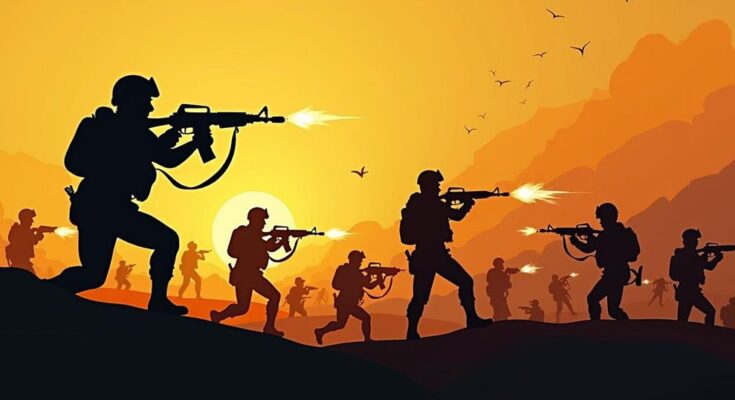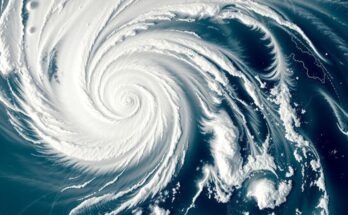Hezbollah is currently fighting Israeli troops in Lebanon amid Israel’s intensified attacks in Gaza, following a significant Iranian missile assault on Israel. Global leaders express concern over the conflict’s escalation, while regional governments emphasize their commitment to national security.
In recent developments, Hezbollah has engaged in clashes with Israeli troops along the Lebanese border, coinciding with Israel’s intensified military actions in the Gaza Strip. Reports indicate that Israeli helicopters have been deployed to evacuate wounded soldiers following a severe assault by Hezbollah in southern Lebanon. Andreas Krieg, a senior lecturer at the School of Security Studies at King’s College London, has observed that any military reprisals by Israel against Iran are unlikely to successfully neutralize Iran’s deeply fortified nuclear installations. He characterized the recent Iranian missile attack on Israel as significantly more impactful than previous incidents, asserting that Israel’s response may necessitate airstrikes targeting Iranian military assets within Iranian territory. Italian Prime Minister Giorgia Meloni has announced her intention to convene a meeting with leaders of the Group of Seven (G7) to deliberate on the escalating tensions in the region. She expressed profound concern regarding Iran’s missile attack and the resultant instability in Lebanon. Meanwhile, the Jordanian government has asserted its commitment to maintaining national security and preventing Jordan from becoming a battleground amidst the current conflict, following Iranian missile strikes in retaliation for the casualties in Gaza and Lebanon. Furthermore, the Lebanese army reported a brief violation of its territorial integrity by Israeli forces, indicating a breach of approximately 400 meters into Lebanese territory before a swift withdrawal. In a global reaction, India has conveyed its deep concern over the conflict escalation, advocating for restraint and the protection of civilians while highlighting the importance of resolving issues through diplomatic channels. Israeli officials have committed to responding to the Iranian missile strikes aimed at military and security targets in Israel, as Foreign Minister Israel Katz explicitly barred UN Secretary-General Antonio Guterres from entering the country due to his failure to condemn Iran’s attacks unequivocally. Following the Iranian strikes, Guterres expressed his disapproval of the violence without mentioning Iran directly, which provoked Katz’s response. In a statement to the press, Hezbollah’s spokesperson Mohammad Afif warned that the recent skirmishes represent merely the beginning of a more extensive conflict, asserting that the group possesses adequate resources to counter any Israeli offensive. He emphasized, “What happened in … Maroun al-Ras and other areas, including Odaisseh, was nothing but the tip of the iceberg,” thus reaffirming Hezbollah’s readiness for escalating confrontations.
The article discusses the ongoing military confrontation between Hezbollah and Israeli forces, set against the backdrop of heightened conflict in the Gaza Strip. Tensions have escalated following a missile attack by Iran on Israel, perceived as retaliation for Israeli operations in Gaza and Lebanon. Various nations, including Jordan and India, have reacted to the situation, emphasizing the need for security and diplomacy. Issues of territorial breaches and international responses also highlight the complexity of the regional dynamics at play.
The situation involving Hezbollah and Israel is indicative of heightened tensions within the Middle East, driven by Iran’s involvement and retaliatory military strikes. Nations are expressing concern about the potential for broader conflict and the implications for regional stability, while Hezbollah’s determination to confront Israel suggests a protracted struggle ahead. As international leaders convene to discuss these developments, the stakes for civilians and regional peace remain alarmingly high.
Original Source: www.aljazeera.com




